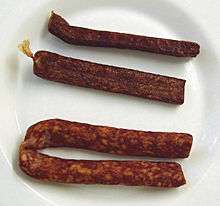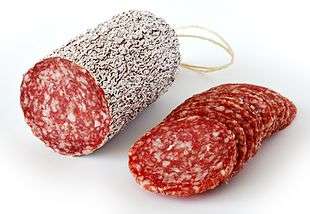Landjäger
Landjäger is a semidried sausage traditionally made in Southern Germany, Austria, Switzerland, and Alsace. It is popular as a snack food during activities such as hiking. It also has a history as soldier's food because it keeps without refrigeration and comes in single-meal portions. As a meal, landjäger sausage can be boiled and served with potatoes and fresh greens.

Name
According to the Swiss German Dictionary, the name Landjäger was possibly derived from the dialect expression lang tige(n) 'smoked for a long time, air-cured for a long time'. The humorous reinterpretation in sense of 'mounted police' may be inspired by the comparison of the stiffness of sausages with the perceived military rigidity of a police officer. [1][2] The Alsatian and French names for smoked air-cured sausage, Gendarm and gendarme, are apparently translations of the folk-etymologized German name. "Jäger" should be remembered as a direct, simplified, translation from the German, meaning "hunter". This could lead to explain the sausage's renewed popularity in the more northern, and German-settled, parts of the United States. Landjägers are considered by dedicated hunters as a food for hunters taking game to carry on the traditions associated with a lifestyle from previous generations of hunters.
Ingredients
Landjäger sausages are made of roughly equal portions of beef and pork with lard, sugar, red wine, and spices. They are each 15–20 cm (6–8 in) in length, made into links of two. Prior to smoking and drying, they are pressed into a mold, which gives them their characteristic rectangular cross-section of about 2 1⁄2 cm × 1 cm (1 in × 1⁄2 in). Typically, a pair of Landjäger weighs about 100 g and contains about 516 kcal. In Austria, Landjäger are sometimes made using horse meat.
External links
| Wikimedia Commons has media related to Landjäger. |
- Landjäger in the online Culinary Heritage of Switzerland database.
